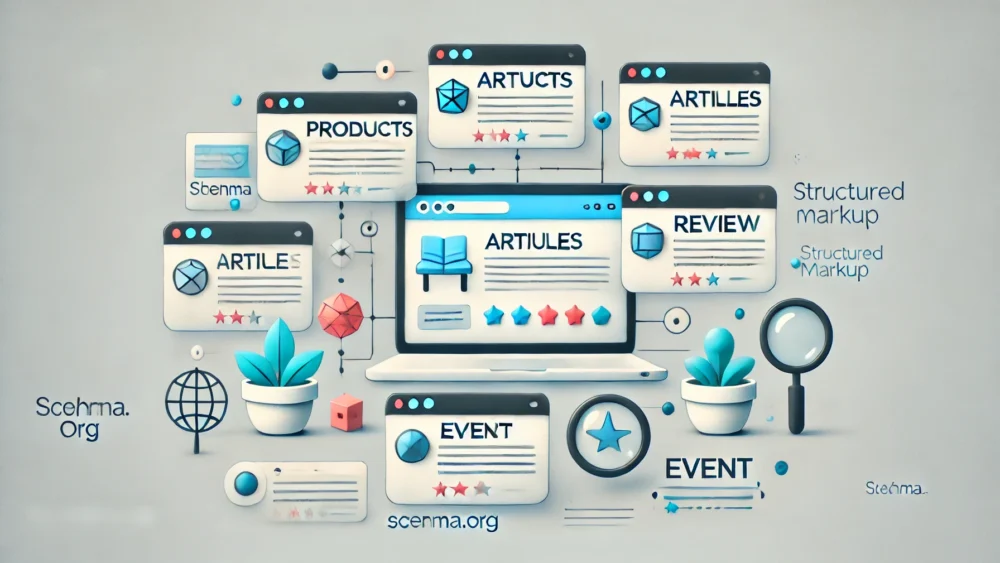Structured data markup is an additional way of tagging the content of a web page. It helps machines (read: search engines) better understand the content of a web page, which improves the display of search results related to that page.
Structured content markup is implemented with the knowledge that different content types have specific properties. These properties are collected into what is known as a “vocabulary.” Vocabularies are collections of property/value pairs that describe content in more detail. The largest search engines (Google, Microsoft, and Yahoo) agreed to standardize these properties into a vocabulary called schema.org.
For example:
* Restaurant content is described with properties like:
* Opening hours
* Address
* Reservations
* Menu
* Book content is described with properties like:
* Number of pages
* ISBN number
* Illustrator
The schema.org vocabulary can be applied to web pages using three syntaxes:
* Microdata
* RDFa
* JSON-LD
The choice of syntax is up to the developer.
Does it Improve SEO?
Personalization and localization of search (especially for mobile searches) are the future of search engines. Structured data provides this level of detail and is believed to improve site rankings. According to the marketing agency Moz, structured data will be a key ranking factor in the future:
“The days of keyword domination are over.”
Schema.org Vocabulary
Schema.org is the most widely known online repository of vocabularies with many predefined content types. The most basic type is “Thing,” and all other types inherit its properties. For example, “Place” inherits from “Thing,” and “LocalBusiness” inherits from both.
You can browse the full hierarchical list here: [http://schema.org/docs/full.html](http://schema.org/docs/full.html)
You can validate your JSON-LD code here: [http://linter.structured-data.org](http://linter.structured-data.org)
Google’s official testing tool is available here: [https://search.google.com/structured-data/testing-tool/](https://search.google.com/structured-data/testing-tool/)
A great article with detailed structured data examples using Microdata and JSON-LD syntax can be found on Builtvisible: [https://builtvisible.com/micro-data-schema-org-guide-generating-rich-snippets/#markup](https://builtvisible.com/micro-data-schema-org-guide-generating-rich-snippets/#markup)
Syntax Types
Microdata
Microdata is a collection of HTML5 attributes used to describe content. To add a property from the schema to HTML code, use the following attributes:
* itemscope: Defines the tag that will contain structured data using the itemprop attribute. Always paired with itemtype.
* itemtype: Defines which schema is used within a tag.
* itemprop: Defines the property related to that tag, often used within a tag.
Example:
Standard tag:
The company name is ProSystem Studio
With structured markup:
The company name is ProSystem Studio
Microdata validators:
* [https://foolip.org/microdatajs/live/](https://foolip.org/microdatajs/live/)
* [http://linter.structured-data.org/](http://linter.structured-data.org/)
Semantic Inspector Chrome extension: [https://chrome.google.com/webstore/detail/semantic-inspector/jobakbebljifplmcapcooffdbdmfdbjh?hl=en](https://chrome.google.com/webstore/detail/semantic-inspector/jobakbebljifplmcapcooffdbdmfdbjh?hl=en)
RDFa
RDFa uses attributes in HTML similar to Microdata:
* vocab: Defines the vocabulary, e.g., vocab=”[http://schema.org/](http://schema.org/)”
* typeof: Defines which schema is used in the tag.
* property: Defines the property related to that tag, usually within a tag.
Example:
Standard tag:
The company name is ProSystem Studio
With structured markup:
The company name is ProSystem Studio
More details: [https://www.w3.org/TR/rdfa-lite/](https://www.w3.org/TR/rdfa-lite/)
JSON-LD
JSON-LD is the newest syntax based on JSON, allowing the insertion of structured data anywhere in HTML via a
Google testing tool: [https://developers.google.com/structured-data/testing-tool/](https://developers.google.com/structured-data/testing-tool/)
Playground: [http://json-ld.org/playground/](http://json-ld.org/playground/)
Benefits of Structured Markup
When web content is marked up with structured data, search engines display it in a rich, detailed format called the "Knowledge Graph."
Example for a hotel:
* Map location
* Reviews and star ratings
* Address
* Phone number
* Working hours
* Photos
* Additional info
Logo Display

Structured markup allows you to define which image will appear as a logo in search results.
Example using JSON-LD:
Corporate contact information can be displayed directly in search results, making it easier for users to find key information without opening the website.
Example using JSON-LD:
To display social media profiles in search results, use the "sameAs" property from the schema.org vocabulary.
Example using Microdata:
FBExample using JSON-LD for Person:
Example using JSON-LD for Organization:














Comments are closed.